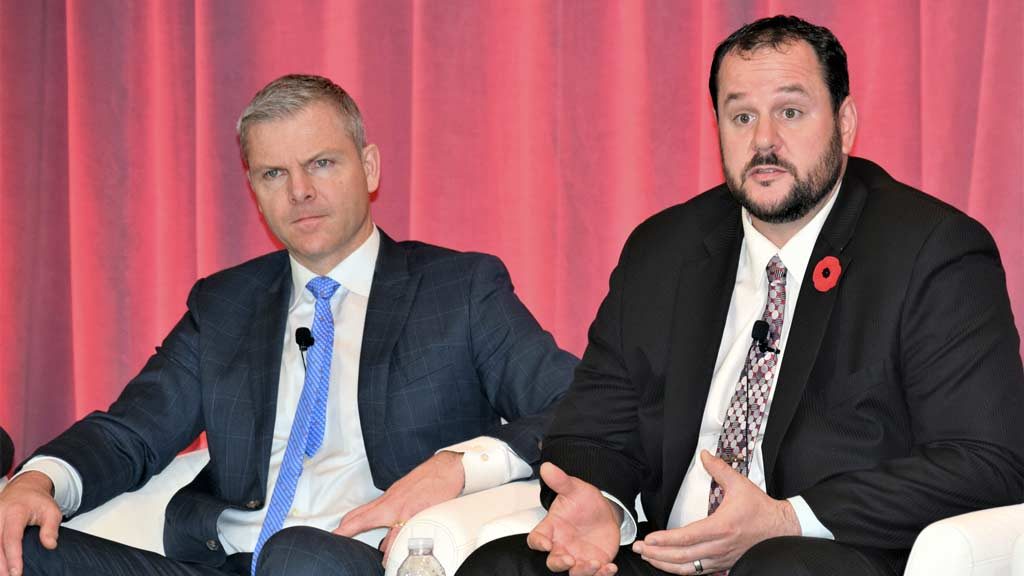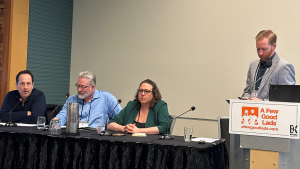Canada’s engineers can play a big role in supporting Canada’s energy and natural resources sectors and breaking the current logjam in project uptake, delegates at the recent ACEC-Canada conference were told.
Representatives of the forest products, petroleum and mining sectors gathered for a panel discussion Oct. 29 to discuss why projects in their sectors have stalled lately.
Panellist Tim McMillan, president and CEO of the Canadian Association of Petroleum Producers, said engineers, politicians and the sector itself need to step up to counter opponents.
“There has been an explicit, well-organized campaign to delegitimize our institutions, to attack our resource sector in general, and I think it has caught us in Canada a little off guard,” he said.
“It will take political leaders stepping forward and the industry stepping forward to meet the expectations of our citizens and to push back actively against those who are utilizing issues sometimes inappropriately to limit resource development in Canada.”
Engineers have unique expertise when it comes to the resource sector and a unique level of trust, McMillan said, as a third party with knowledge of the issues.
“That would be my ask today, we are looking for opportunities for engineers to bring their expertise into the marketplace,” he said.
Other panellists were Brendan Marshall, vice-president, economic and northern affairs for the Mining Association of Canada, Bob Larocque, senior vice-president with the Forest Products Association of Canada, and Michael Cleland, senior fellow with the Positive Energy Initiative at the University of Ottawa.
Topics addressed included challenges caused by climate change and technological transformation, environmental and other regulations, workforce shortages and the infrastructure shortfall.
When you get down to the level of local communities, almost always other priorities will come in ahead of climate change
— Michael Cleland
University of Ottawa Positive Energy Initiative
Moderator Jerome Pelletier, executive director of business development with the firm BBA, noted that the mining sector is viewed as notoriously slow to adopt technical innovations and asked Marshall for his take.
Marshall said the mining sector has unique circumstances within the resource sector in that many mineral and metal deposits are in remote and northern areas, thus attempts to transition to low-carbon, energy-efficient practices take a back seat to basic infrastructure needs. A mine in Sudbury has the advantages of any other industry, he said, but a mine in Nunavut with no roads, no port or no gas has to rely on diesel.
“There is no optionality for that firm to modify its practices,” Marshall said.
“We have a splintered spectrum that our members are situated in that makes them differently enabled for some members to achieve goals,” said Marshall.
But many firms buck the trend, he said, and the sector is committed to modernizing. Goldcorp’s Borden mine in northern Ontario, for example, will be a net zero carbon mine when it opens in 2021.
Engineering firms are delivering the expertise needed to make those advances, he said — for example, increased efficiencies in the far north ensure the mechanics of cold-weather operations are modern and competitive.
McMillan said the oil and gas sector is also taking major strides to reduce its environmental footprint. There have been significant improvements on water usage, emissions and land usage, he pointed out.
“Canada’s energy sector has a great story to tell,” he said.
Marshall described the mining association’s approach to opponents.
“We look critics directly in the face, we listen to what they have to say to us, we take that into account and then build a program that over time addresses the concerns they have while continually changing and adjusting that program in a way that is reflective of the expectations of society writ large,” he said.
Cleland’s Positive Energy initiative describes its mandate as using the convening power of the university to bring together academic researchers and other stakeholders to determine how to strengthen public confidence in energy decision-making. Positive Energy has found that in most cases of opposition to projects, the issues can be dealt with on a local level and often at that level the issues are not truly environmental, Cleland noted.
“When you get down to the level of local communities, almost always other priorities will come in ahead of climate change,” he said, including cultural and other impacts, and in general those concerns are legitimate, fair and reasonable.
As for innovation, said Cleland, the sectors should think more broadly than merely pursuing new technology.
“We define innovation as meaning new and shinier but there is a whole realm of innovation that goes to the way we structure institutions,” he said. “That is central to making these sorts of decisions and there is a lot of work on that to be done.”
Discussing buy-in from Indigenous communities for resource projects, Marshall argued stakeholders need to strive for balance to enable social objectives to be met.
“We need a strong, integrated approach,” he said. “You can’t address climate change in the north without infrastructure. You can’t build infrastructure in the north without a mine as an anchor tenant to justify the investment in the first place. You are never going to build a mine in the north unless you can demonstrate a substantial economic benefit to the Indigenous communities. There has to be a unified approach. That is the challenge in the public policy space.”
Follow Don Wall on Twitter @DonWall_DCN.







Recent Comments
comments for this post are closed